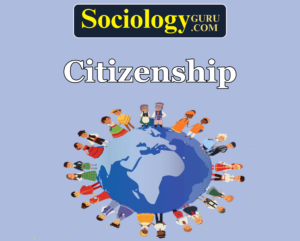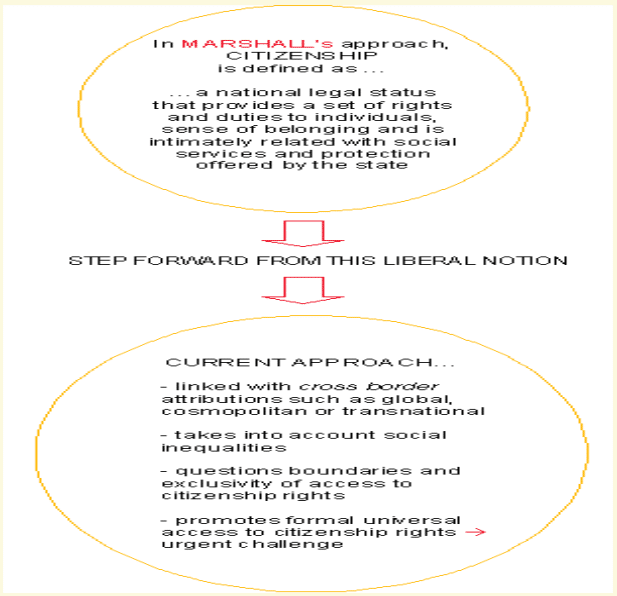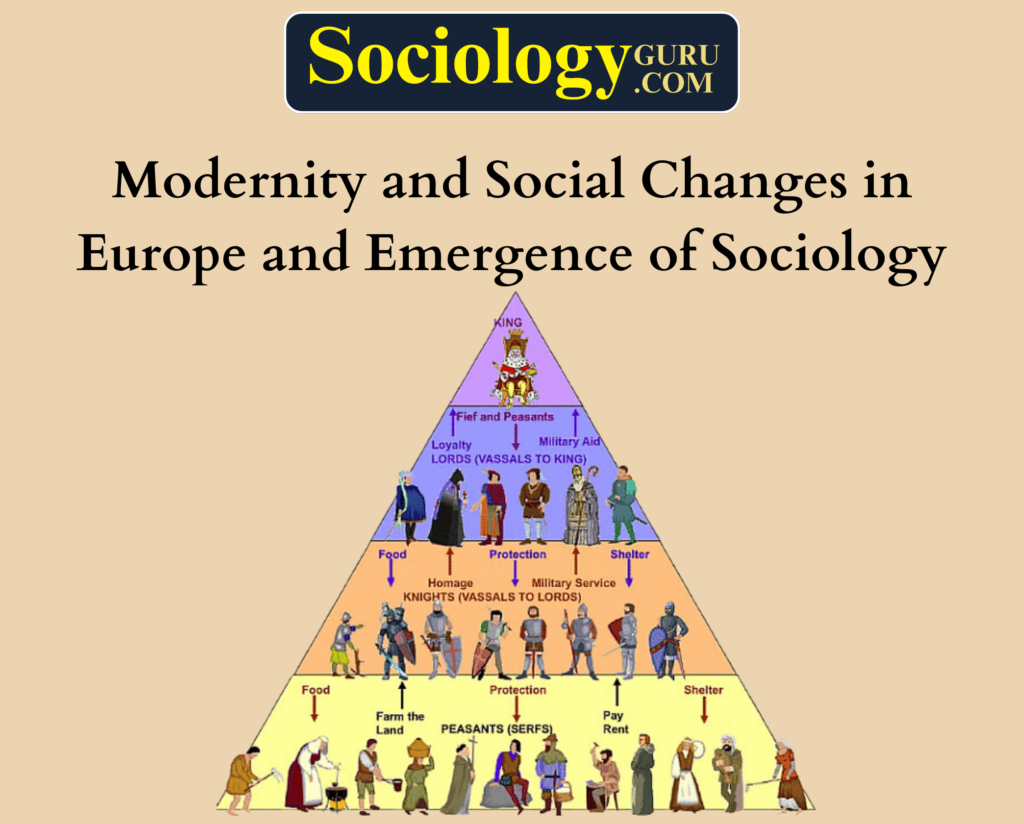Citizenship
(Relevant for Sociology optional for UPSC CSE)
Paper-1 ,Unit-7 : Citizenship

The state exists to promote the welfare of the individual. The individual members of a state have been called, in recent times, its citizens. Etymologically considered, ‘citizenship’, implies the fact of residence in a city (i. e., a city-state). A ‘citizen’ means one who lives in a city. But, now-a-days, the world has come to have a much larger meaning. We say ‘a citizen of India’ although India is not a city. So a citizen means member of a community, or a State. Just as a man owes a duty to his father and mother, so a citizen owes a duty to the State. For the State is more than father and mother. When one is young one goes on making demands on one’s parents. But when one grows up one realizes that one owes service and sacrifice to one’s parents and elders. It is the same with a citizen. When a citizen is young in citizenship, he makes a demands on the State and expects everything to be done for him.
Citizenship consists not merely in enjoying certain rights and guarantees, but also in discharging one’s obligations conscientiously. There should be a desire to contribute one’s mite to the welfare of society manifested in an active participation in public affairs for the improvement of cultural, political and material aspects of social life. Without such participation citizenship is meaningless. It aims at the common good as distinct from exclusively sectional good. It depends not only upon enlightenment but also on a high average of character—a character essentially social in its make-up, a spontaneous regard for the happiness and welfare of others as Laski puts it, “the contribution of one’s instructed judgment to public good.”
Citizenship has been defined as the legal status of membership of a state. The legal status signified a special attachment between the individual and the political community. With the creation of the modern state, citizenship came to signify certain equality with regard to the rights and duties of membership to the state. The modern state began to administer citizenship. State determines who gets citizenship, what the associated benefits are, and what rights and privileges it entails. As a legal status, citizenship has come to imply a unique, reciprocal, and unmediated relationship between the individual and the political community. Citizenship, in short, is nothing less than the right to have rights.
Who is a citizen?
In brief a citizen is a person who enjoys rights and performs his duties in a state. Anyone who lives in India is not an Indian citizen. Because besides citizens, aliens also live here. Therefore, every inhabitant of the country is not a citizen.
- A citizen is one who is a member of the state and who participates in the process of government. In a democratic society there must be two way traffic between the citizens and the government.
- All governments demand certain duties from its citizens and all citizens have to observe those duties. But in turn, the state must also admit some demands of its citizen on itself.
- Subject in Non democratic states: People who live in States which are not democratic often do not enjoy political right. In such a State the government expects the subjects to perform their duties to pay taxes, to obey laws do whatever else the government wants of them. But they cannot question state rules or ask them to explain their state action. Politics in these societies is like one way traffic. The government tells the people what to do and what not to do but does not listen to them in return. Only the rulers have rights. The ruled have none and hence they are not citizens.
Democracy and citizenship:
Historically, the term ‘citizen’ was linked with the rise of democracy. The demand for democratic government came up first in a few western societies, like England, France and the United States of America. Democracy means that everybody should have political rights. When one has political rights, the right to vote and the right to participate in decision making on important questions facing one’s society, one is a citizen.
- Of course, all these ideas did not grow up all of a sudden. It took a long time for them to mature. They grew up gradually. Universal suffrage a system in which literally everybody can vote – is a fairly recent development. The ideals of democracy made people fight for their rights against monarchical government. Many of the ideas of which democracy is made up are accepted after great revolutions. For instance, after the revolution of 1789 France became a republic. All citizens, it was said, were equal: they had equal rights. Not surprisingly, the word ‘citizen’ was made popular by the French Revolution in 1789. Later on, this word was used whenever democracies were set up.
- At present it is common to treat people in democratic societies as ‘citizens’. It means that in relation to the government, the individuals are active participants in the process of governance. They not only obey and listen to what the government says the government must also listen to them in turn.
- In democratic state citizens have the right to express their opinion freely, to be consulted and to be involved in the politics of the country. In democratic politics, the common human being no longer is treated as an outsider.
- A democratic state particularly depends on the quality of its citizens. If citizens do not take interests in politics, a democratic state might also gradually become undemocratic.
- Conversely democracy can be strengthened if the citizens have a clear view of other own rights and the rights of others; if they demand what they can claim from the government; and if they know what the government can claim from them.
- Many social evils cannot be fought only by the government passing laws against them. There is a need to create an intense social opinion among citizens against such social evils. A society is after all made by humans and not by laws..
- One essential condition for a democratic state is that citizens must participate in the governing process. The quality of democracy improves if citizen from all walks of life participate in its activities and if they take interest in the basic processes of making importance decisions for their society. Democracy implies that the decisions affecting the whole society should be taken as far as possible by the whole society by citizens participation.
- In a democracy, a good citizen is one who is conscious of both rights and duties. For example, the right to vote is one of our most important rights and it is our duty also to exercise the right to vote. If a person does not vote she or he cannot be considered a good citizen, though otherwise she or he may be a good person.
- In a democracy, good citizen should not only be conscious of their own rights alone, but also give the government what is its due they should obey laws that are made by the legislature and pay taxes. These are their duties towards the government. But they must also perform their duties to other citizens. And the most important duty of every citizen is to respect the rights of others. For example, Our Constitution gives everyone the right to practice one’s religion. Every citizen, should practice religion in her/his own way; but in doing so one must respect the right of other citizens to practice their religion in the way they like. The qualities of good citizens must, therefore, include a consciousness of their own right tolerance for others and respect for laws.
Citizenship: a historical perspective:
In the 19thC. Britain and USA provided the voting right even to commoners and eventually CIVIL RIGHTS were completed. In the countries like Sweden citizen’s rights were denied even till the advent of 20th C., which saw people fighting for their rights under socialist ideology and leadership, which subsequently created revolutionary socialism on the one hand, and achievement of citizen’s rights on the other. Similarly till Russian Revolution people were not provided equal rights to vote and freedom. In Germany civil rights were achieved late in 19th C. under the dominance of Reformative Democracy and non-revolutionary socialism.
British sociologist T.h. marshal has first time wrote in details about citizenship and given the prime importance to class-struggle in modern states in which he included the ideas of Marx and Weber. Marshal envisages that capitalism has increased class-struggle in modern societies. T. H. Marshall wrote a seminal essay on citizenship, titled “Citizenship and Social Class”. This was published in 1950. He analysed the development of citizenship as a development of civil, then political, then social rights. These were broadly assigned to the eighteenth, nineteenth and twentieth centuries respectively.
- His distinctive contribution was to introduce The concept of social rights Sunderstood as the welfare rights. Social Rights are awarded not on the basis of class or need, but rather on the status of citizenship. He claimed that the extension of social rights does not entail the destruction of social classes and inequality. In Britain, citizenship was obtained at three stages:
- Urban Citizenship (Civil) – 18th Century: Equality before law, individual freedom, right of speech and religion, right to possess property and to obtain contracts.
- Political citizenship-19th Century: Right to vote and to be voted.
- Social Citizenship-20th Century : Complete participation of individuals in state.
- Critics criticized marshal’s modal as only the description of British experiences and that it is silent on the issue of economic citizenship.
- Marxist critics point out that Marshall’s analysis is superficial as it does not discuss the right of the citizen to control economic production, which they argue is necessary for sustained shared prosperity.
- From a feminist perspective, the work of Marshall is highly constricted in being focused on men and ignoring the social rights of women and impediments to their realisation.
- There is a debate among scholars about whether Marshall intended his historical analysis to be interpreted as a general theory of citizenship or whether the essay was just a commentary on developments within England.
- The essay has been used by editors to promote more equality in society, including the “Black” vote in the USA, and against Mrs. Thatcher in a 1992 edition prefaced by Tom Bottomore. It is an Anglo-Saxon interpretation of the evolution of rights in a “peaceful reform” mode, unlike the revolutionary interpretations of Charles Tilly, the other great theoretician of citizenship in the twentieth century, who bases his readings in the developments of the French Revolution.

Global citizenship:
Basically citizenship provides an identity which further gives opportunity for some evils like regionalism, communalism etc to develop. Global citizenship can play an important role in abolishing these evils. In fact, globalization is creating a cultural uniformity worldwide and this would further nationality to diminish the identity related with soil and blood.
Dual citizenship:
Great efforts are made to maintain one’s cultural identity in dual citizenship which is an indication of narrow-mindedness. In most of the cases it is provided for material gains and facilities. There is hardly the feeling of love and attachment to the soil in it. But it can be used to strengthen relation between any two countries.
Citizenship: rights and duties:
- Harold J. Laski opines that every state is recognized by its rights. The state is not only a sovereign institution liable for citizen’s discipline having the power of obeying the orders but some additional powers and morality are also instilled in the state.
- The way citizens have certain responsibilities towards the state, state also has certain responsibilities towards citizens like availing them those opportunities necessary for their physical, mental and moral development. In this way it is a two-way process which develops and maintains a healthy and balanced society.

